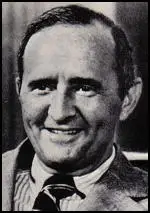Louis Harris

Louis Harris was born in New Haven, Connecticut, on 6th January, 1921. He attended New Haven High School and the University of North Carolina at Chapel Hill, where he graduated in 1942.
In 1947 Harris went to work for Elmo Roper. Initially he worked as Roper's assistant in his marketing research company. However, Roper was against working for politicians. He argued: "I think prediction of elections is a socially useless function. Marketing research and public opinion research have demonstrated that they are accurate enough for all possible commercial and sociological purposes. We should protect from harm this infant science which performs so many socially useful functions, but which could be wrong in predicting elections, particularly in a year like this."
In 1956 Harris left Roper's business and started his own firm, Harris and Associates. It was well-known that the country's leading pollster, George Gallup, was a secret supporter of the Republican Party. Harris held progressive views and wanted to work for the Democratic Party. Harris commented: "For this poll-taker's part, he will never undertake to work for any candidate he believes will set back human progress."
In 1959 John F. Kennedy recruited him to do all his polling for the forthcoming presidential campaign. He paid Harris $400,000 for his surveys, much more than a political pollster had ever received before. Harris argued in his autobiography, The Anguish of Change (1973): "I don't think any poll-taker before or since has sat on a strategy committee. Joe Kennedy, Bobby and Jack Kennedy, and I - we were the inner strategy committee. So I was part of and privy to the whole bloody campaign. The only people who got the polls were Jack and Bobby, nobody else." Elmo Roper attacked those "so-called public opinion researchers," who allow their polls to be exploited "rather openly for propaganda purposes."
After his victory in the 1960 Presidential Election, Kennedy apparently told Harris that "maybe next to me you've got more power than anybody else in this country." Harris agreed and he told the New York Times: "When polls figure largely in the outcome of a major victory, such as... President Kennedy's in Virginia in May, 1960, the poll-taker becomes a kind of political miracle worker." One former Kennedy aide commented: "Face it, politicians have big egos, bigger than anybody's. Harris was smart. He'd come in with these polls that showed that everybody adored Kennedy, and Kennedy ate it up." Ted Sorensen disagreed with this assessment and claimed that Kennedy "felt that a pollster's desire to please a client and influence strategy sometimes unintentionally coloured his analysis."
Michael Wheeler, the author of Lies, Damn Lies, and Statistics: The Manipulation of Public Opinion in America (2007), has pointed out: "During the campaign he would sometimes engage in flights of fancy about his future after the election... some people close to Harris at the time say he would wistfully imagine himself as director of the CIA one day and secretary of commerce the next... Having supposedly masterminded a presidential campaign, Harris became the number one political pollster. Democrats who wanted to win came to him, and they paid top dollar for what they got."
In 1962, Harris devised a new analysis technique for CBS News to enable the television network to predict the outcome of an election based on computer analysis of voting results from a small number of key voting areas. The following year he decided to challenge George Gallup by syndicating the Harris Survey.
Harris sold Louis Harris & Associates to the Gannett Corporation. In January 1992, Lou Harris formed his own company, LH Associates.
Louis Harris died on 17th December, 2016.
Primary Sources
(1) Michael Wheeler, Lies, Damn Lies, and Statistics: The Manipulation of Public Opinion in America (2007)
During the campaign he would sometimes engage in flights of fancy about his future after the election... some people close to Harris at the time say he would wistfully imagine himself as director of the CIA one day and secretary of commerce the next... Having supposedly masterminded a presidential campaign, Harris became the number one political pollster. Democrats who wanted to win came to him, and they paid top dollar for what they got. Having dominated the political field, Harris turned in 1963 to challenge Gallup by syndicating the Harris Survey. He has developed that, plus considerable commercial work, into a firm which has made him a millionaire.

